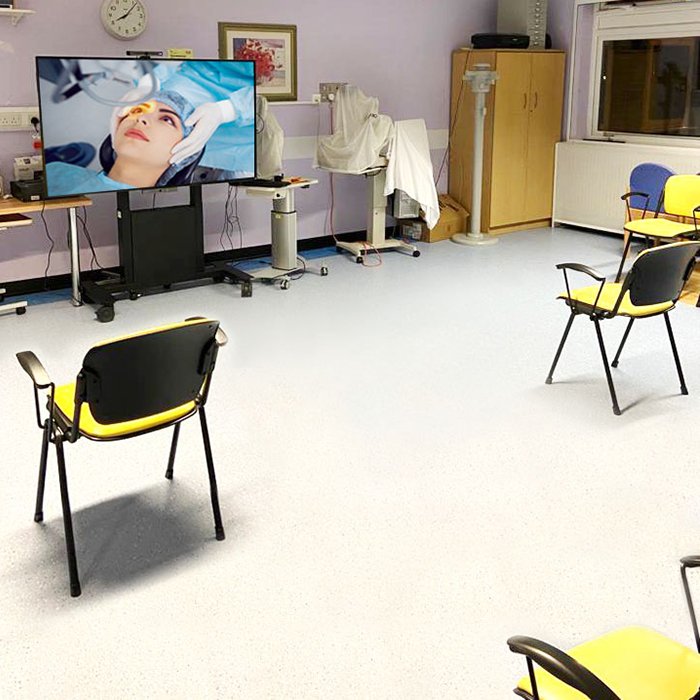How Royal Berkshire Hospital Overcame COVID-19 Setbacks with BenQ Display Solutions
- BenQ
- 2021-04-20


Established in 1839, the Royal Berkshire Hospital (RBH) in Reading has provided over two centuries of professional health care services to residents of Berkshire, England. Prior to the COVID-19 outbreak, the hospital’s staff had been looking into acquiring potential corporate solutions that would help them further advance their internal processes and improve the quality of their meetings. Dr. Sumith Perera, the principal consultant at RBH for eye casualty and cataract surgery, as well as the clinical lead of the Prince Charles Eye Unit at Windsor, needed a solution that could connect multiple experts from different locations for large monthly sync ups. It was critical for him and his colleagues to be all on the same page and well-equipped to meet their patients’ needs. For this reason, they sought out BenQ.
Royal Berkshire Hospital | Prince Charles Eye Unit
The Prince Charles Eye Unit based in Windsor is a special branch of the Royal Berkshire Hospital that provides treatment, emergency services, and surgery for patients with eye problems.
Enduring the first wave
“All our admin and business meetings were face-to-face,” says Dr. Perera, “We used flipcharts, whiteboards, and medium-sized screens in the boardroom for presentations.” Although these existing meeting tools were helpful, they also found them very limiting. These traditional solutions did not allow them to collaborate remotely. Since their workgroups are scattered across different Royal Berkshire NHS Foundation Trust sites, they had to come up with a viable schedule that would allow them to meet in person, hence the monthly gatherings. The setup was not agile enough; an issue that was further exacerbated by the pandemic.
“During the first wave of COVID-19 cases, all face-to-face meetings were banned,” explains Dr. Perera. RBH had implemented strict protocols to ensure the safety of their patients and staff. This involved the aforementioned ban and a shuffling of priorities. “We had a huge backlog for surgery,” he explains, “Our priority was to work on as many cases as possible to reduce the waiting times for routine surgery. This needed a lot of coordination between sites and regular planning meetings, as the availability of staff for routine work changed day to day depending on the additional demands from COVID-related services.”
At that point, it quickly became clear that their existing meeting setups were no longer sustainable. Noting how the new restrictions had prevented them from having in-person meetings not only with their patients but also with other teams within the RBH system, Dr. Perera’s department had to reassess their strategy and adapt quickly.
One of the first changes was the frequency of their meetings. From a monthly affair, their staff sync ups became a weekly and even daily occurrence. This way, they could closely monitor any immediate developments in their region and at the hospital. They had a core group of fifteen medical professionals arranging the logistics to ensure that they could still provide patient care and that all scheduled surgeries would proceed as planned. Another significant change was the enforcement of social distancing. Since all fifteen people were stationed in one room, and they had to adhere to the two-meter distancing protocol, the BenQ DuoBoard and video conferencing solutions played a vital role.

Dr. Sumith Perera
MBBS. DCEH MRCOphth. FRCS. Cert. LRS Consultant ophthalmologist, cataract and refractive surgeon
“What the DuoBoard has done is enable us to have group discussions
in a socially distanced environment.”

Inside the Prince Charles Eye Care Unit at the Royal Berkshire Hospital
Establishing new protocols
The RBH originally acquired BenQ DuoBoards because they were able to fulfill their meeting requirements. Since the DuoBoard has built-in cloud whiteboarding, Dr. Perera’s team no longer needed flipcharts or physical whiteboards. The large-format displays gave them a wider screen for their presentations—a feature that helped with their internal COVID-prevention efforts.
“What the DuoBoard has done is enable us to have group discussions in a socially distanced environment. The screen was large enough for our staff to see all the details being shared. It allowed more interaction compared to when we had meetings using desktops and laptops,” says Dr. Perera.
With the emergence of COVID-19, they were not only able to maximize the DuoBoard for social distancing, they also managed to smoothly transition into an operational hybrid working setup.
“We had 10% of our staff on-site while the rest were working remotely or from home,” notes Dr. Perera. “We used the BenQ cameras with wide field of view so that remote staff can clearly see everyone in the room.”
BenQ solutions at RBH
- DuoBoard 65" corporate interactive displays
- IE1004-B Intel® Core™ i7 OPS slot-in PCs
- DVY22 smart 4K conference cameras
- WDR02U Wi-Fi Bluetooth USB adapters
Their DuoBoards also came with BenQ OPS slot-in PCs, which allowed them to use the RBH-prescribed conferencing solution, Microsoft Teams, directly from their displays. Dr. Perera explains that the hospital uses Teams to meet their data protection requirements. And since the DuoBoard with the slot-in PC offered them the flexibility to use their preferred conferencing solution, it was an easy decision for them to choose BenQ.
“The DuoBoard has been particularly useful when we’re showing facts and figures to staff participating from different sites.”
“Surgeries involve multidisciplinary input from teams and staff from different sites,” explains Dr. Perera. “We need to factor in pre-operative assessments, COVID swabbing, theatre nursing staff allocations, anaesthetic and surgeon allocations. The BenQ solutions allow us to meet regularly to discuss these items. The DuoBoard has been particularly useful when we’re showing facts and figures to staff participating from different sites.”
With how well their DuoBoards are facilitating hybrid work and cross-site collaboration, Dr. Perera and his team are now considering making their current setup a permanent one. It saves them the time and effort required to set up monthly in-person meetings, makes their teams more agile, and allows them to easily observe COVID-19 protocols.